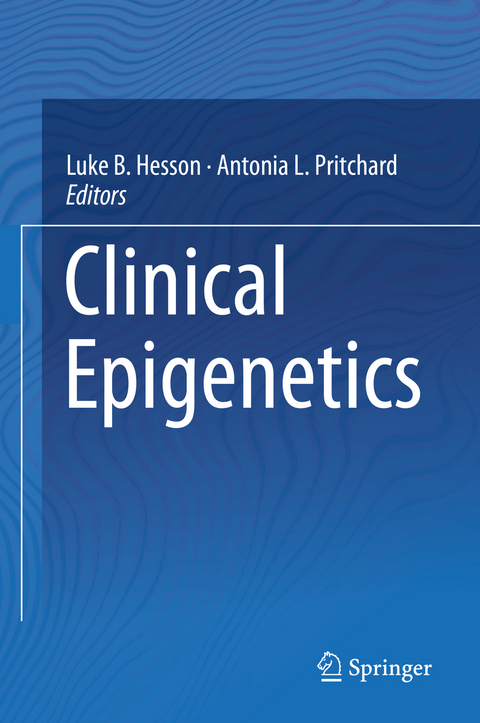
Clinical Epigenetics
Springer Verlag, Singapore
978-981-13-8957-3 (ISBN)
The book begins with a historical perspective of genetics and epigenetics and describes the work of pioneers who have helped shape these fields. The various mechanisms by which epigenetics can regulate the function of the genome is described. These include DNA methylation, histone modifications, histone variants, nucleosome positioning, cis-regulatory elements, non-coding RNAs and the three-dimensional organisation of chromatin in the nucleus. These are discussed in the context of embryological development, cancer andimprinting disorders, and include examples of epigenetic changes that can be used in diagnosis, prediction of therapeutic response, prognostication or disease monitoring. Finally, for those wishing to implement epigenetic testing in a diagnostic setting, the book includes a case study that illustrates the clinical utility of epigenetic testing.
Associate Professor Luke B. Hesson is a Clinical Scientist who has studied the genetic and epigenetic causes of cancer for more than 18 years. He holds a doctorate in Clinical Genetics from The University of Birmingham UK and is a former Director for the Australian Society for Medical Research (2012-2015). In 2016 he was admitted as a Fellow of the Faculty of Science of the Royal College of Pathologists of Australasia. He has lectured at the University of New South Wales, Sydney in genetics, epigenetics, cancer, pathology and personalised medicine. Luke is currently the Head of Cancer Diagnostics and Laboratory Director at the Garvan Institute of Medical Research DNA sequencing facility in Sydney, which provides clinically accredited genome sequencing. Dr. Antonia L. Pritchard is currently a Senior Lecturer at the University of the Highlands and Islands, Scotland, UK and a visiting scientist at QIMR Berghofer Medical Research Institute, Brisbane, Australia. She gained her Ph.D in Psychiatric Genetics from the University of Birmingham in 2005. Her research interests have centred around the genetic influence on disease (including Alzheimer’s disease, asthma and cancer) and on the human immune system. Dr Pritchard has published over 60 peer reviewed articles on these themes and continues to work on the interaction of genetics, genomics and immunology in cancer, particularly focused on melanoma. She is a member of the British Society of Immunology (BSI), the American Association for Cancer Research (AACR), the Association of Cancer Immuotherapy (CIMT) and the Society for Melanoma Research (SMR). Dr Pritchard’s research group is a member of the GenoMEL Consortium and the BAP1 Interest Group (BIG) Consortium, both of which are highly productive, collaborative and multidisciplinary groups which comprise researchers from across the World.
Genetics and epigenetics: a Historical Overview.- The DNA methylation machinery.- Methylcytosine and its oxidised derivatives.- The role of nucleosomes in epigenetic gene regulation.- Circular RNAs in human health and disease.- The role of histone variants in cancer.- DNA methylation and carcinogenesis: Current and future perspectives.- Dysregulation of cis-regulatory elements in cancer.- Germline epigenetic testing of imprinting disorders in a diagnostic setting.- Cancer methylation biomarkers in circulating cell-free DNA.- The clinical utility of epigenetics
| Erscheinungsdatum | 27.09.2019 |
|---|---|
| Zusatzinfo | 8 Illustrations, color; 26 Illustrations, black and white; XI, 265 p. 34 illus., 8 illus. in color. |
| Verlagsort | Singapore |
| Sprache | englisch |
| Maße | 155 x 235 mm |
| Themenwelt | Medizin / Pharmazie ► Medizinische Fachgebiete |
| Studium ► 2. Studienabschnitt (Klinik) ► Humangenetik | |
| Naturwissenschaften ► Biologie ► Genetik / Molekularbiologie | |
| Schlagworte | Diagnostic • Disease • epigenetics • Genetics • Pathology |
| ISBN-10 | 981-13-8957-8 / 9811389578 |
| ISBN-13 | 978-981-13-8957-3 / 9789811389573 |
| Zustand | Neuware |
| Informationen gemäß Produktsicherheitsverordnung (GPSR) | |
| Haben Sie eine Frage zum Produkt? |
aus dem Bereich


